Governance and Stewardship: Theories, Leadership, and Organizations
VerifiedAdded on 2023/01/16
|14
|3576
|22
Essay
AI Summary
This essay delves into the concepts of governance and stewardship, exploring various theories and their practical applications within organizations. It begins by introducing the significance of corporate governance and then examines key governance theories, including agency theory, stakeholder theory, and deontological ethics, highlighting their strengths and weaknesses. The essay then focuses on stewardship theory, detailing its contribution to effective governance, particularly in non-profit and profit-oriented organizations. It emphasizes how stewardship fosters trust, autonomy, and alignment between organizational goals and business strategies. The essay also explores the critical relationship between leaders' values and beliefs and their impact on effective governance, underscoring the importance of ethical principles and leadership in driving organizational success. The content is supported by academic theories and research papers.
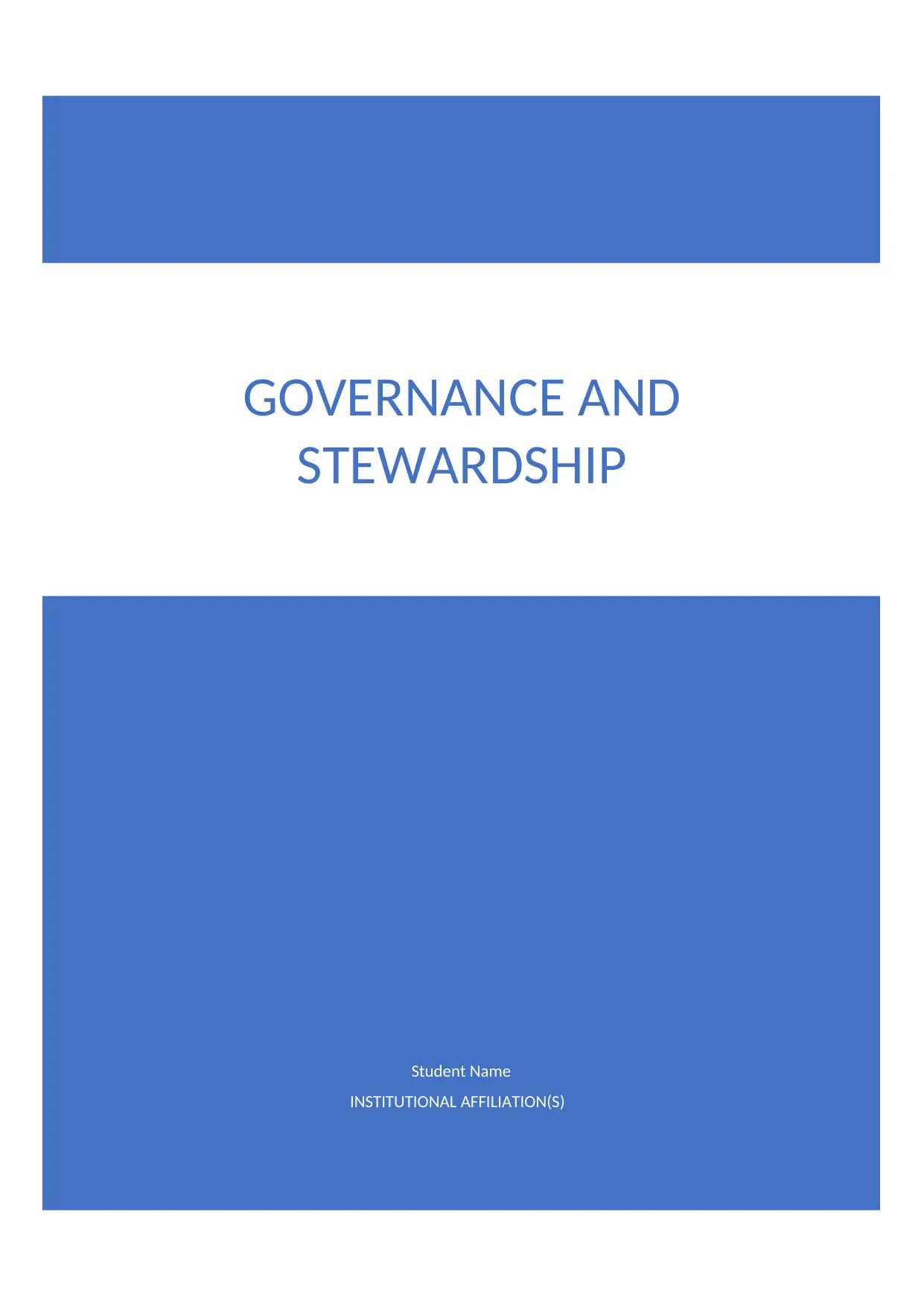
Student Name
INSTITUTIONAL AFFILIATION(S)
GOVERNANCE AND
STEWARDSHIP
INSTITUTIONAL AFFILIATION(S)
GOVERNANCE AND
STEWARDSHIP
Paraphrase This Document
Need a fresh take? Get an instant paraphrase of this document with our AI Paraphraser
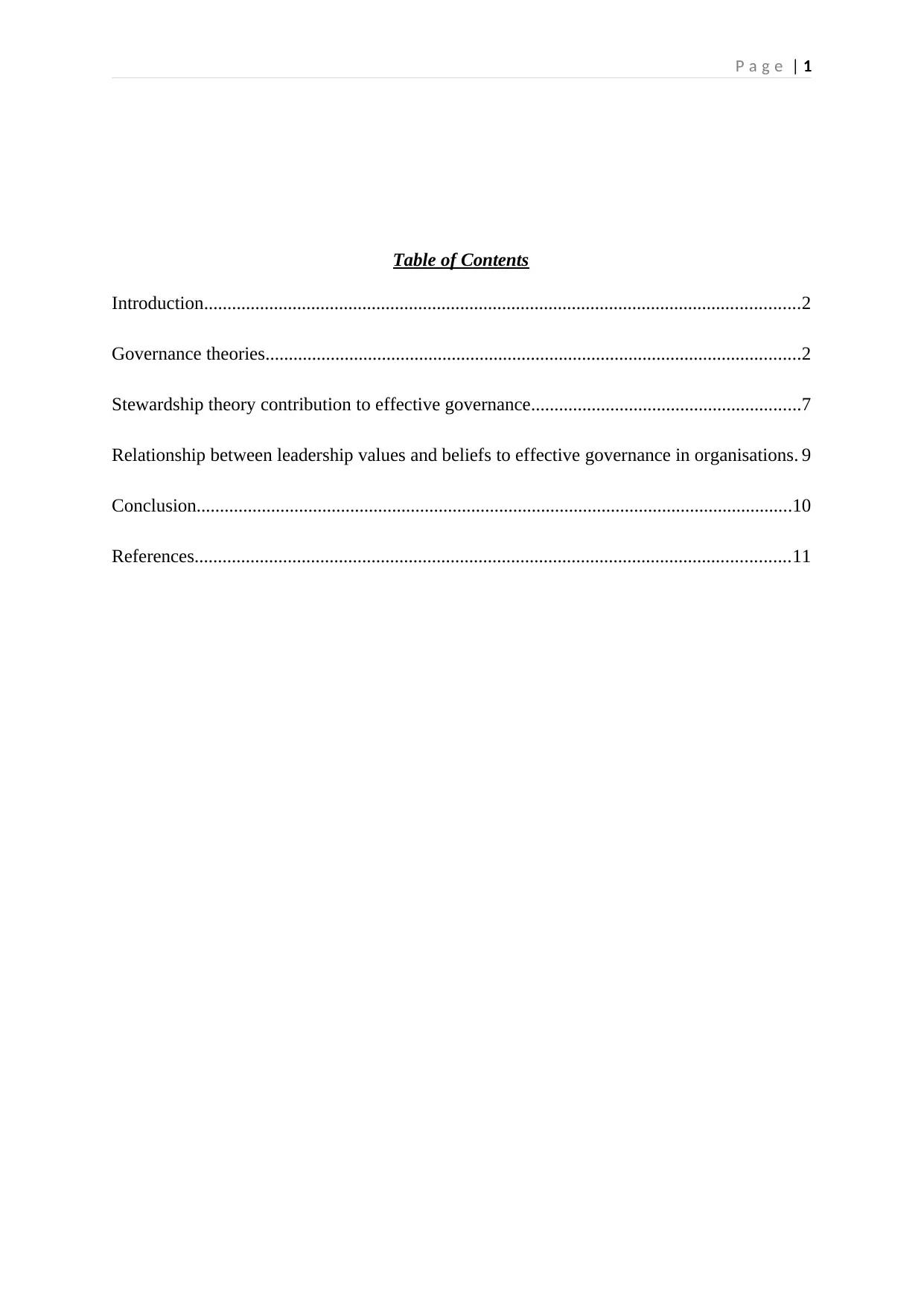
P a g e | 1
Table of Contents
Introduction................................................................................................................................2
Governance theories...................................................................................................................2
Stewardship theory contribution to effective governance..........................................................7
Relationship between leadership values and beliefs to effective governance in organisations. 9
Conclusion................................................................................................................................10
References................................................................................................................................11
Table of Contents
Introduction................................................................................................................................2
Governance theories...................................................................................................................2
Stewardship theory contribution to effective governance..........................................................7
Relationship between leadership values and beliefs to effective governance in organisations. 9
Conclusion................................................................................................................................10
References................................................................................................................................11
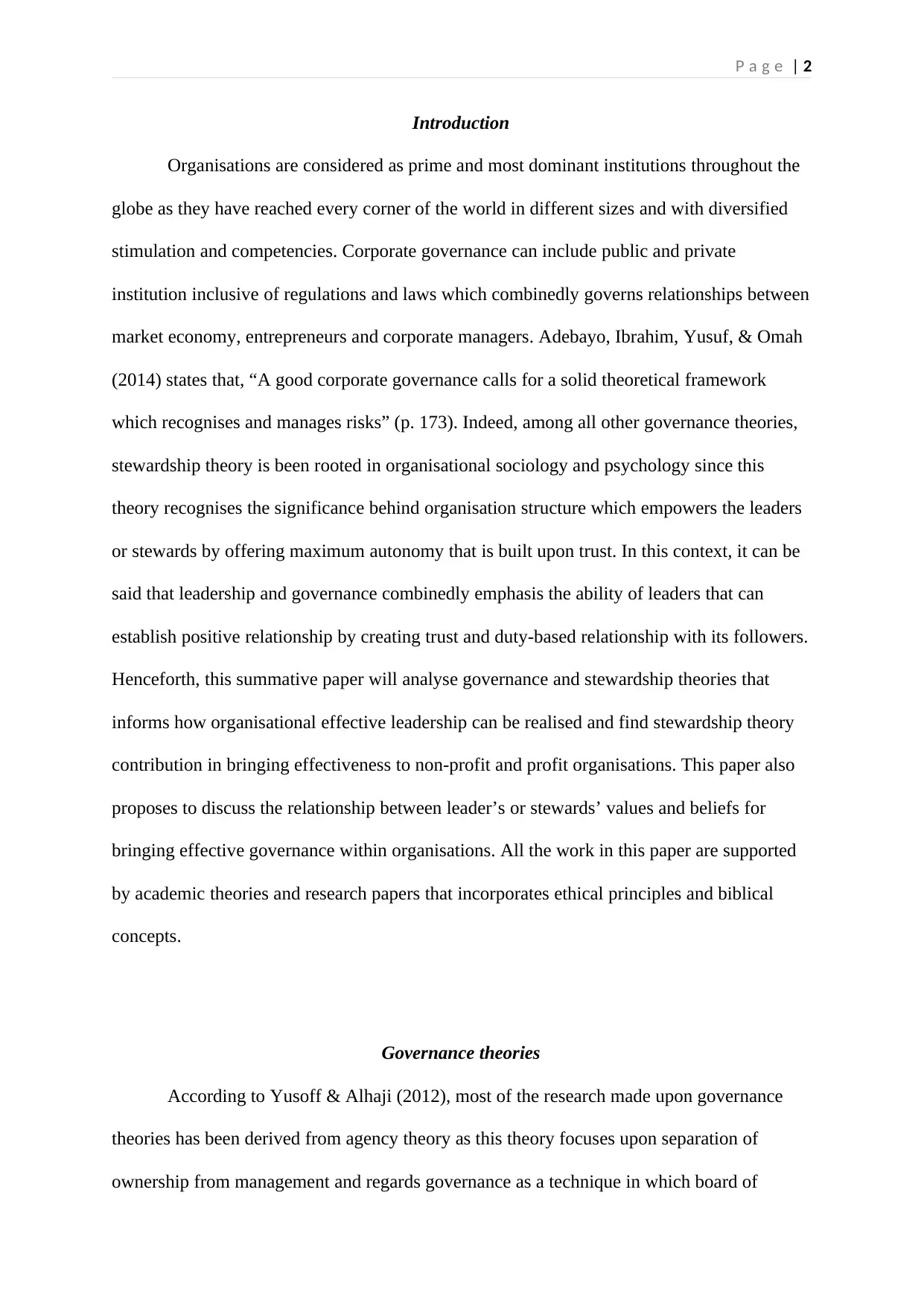
P a g e | 2
Introduction
Organisations are considered as prime and most dominant institutions throughout the
globe as they have reached every corner of the world in different sizes and with diversified
stimulation and competencies. Corporate governance can include public and private
institution inclusive of regulations and laws which combinedly governs relationships between
market economy, entrepreneurs and corporate managers. Adebayo, Ibrahim, Yusuf, & Omah
(2014) states that, “A good corporate governance calls for a solid theoretical framework
which recognises and manages risks” (p. 173). Indeed, among all other governance theories,
stewardship theory is been rooted in organisational sociology and psychology since this
theory recognises the significance behind organisation structure which empowers the leaders
or stewards by offering maximum autonomy that is built upon trust. In this context, it can be
said that leadership and governance combinedly emphasis the ability of leaders that can
establish positive relationship by creating trust and duty-based relationship with its followers.
Henceforth, this summative paper will analyse governance and stewardship theories that
informs how organisational effective leadership can be realised and find stewardship theory
contribution in bringing effectiveness to non-profit and profit organisations. This paper also
proposes to discuss the relationship between leader’s or stewards’ values and beliefs for
bringing effective governance within organisations. All the work in this paper are supported
by academic theories and research papers that incorporates ethical principles and biblical
concepts.
Governance theories
According to Yusoff & Alhaji (2012), most of the research made upon governance
theories has been derived from agency theory as this theory focuses upon separation of
ownership from management and regards governance as a technique in which board of
Introduction
Organisations are considered as prime and most dominant institutions throughout the
globe as they have reached every corner of the world in different sizes and with diversified
stimulation and competencies. Corporate governance can include public and private
institution inclusive of regulations and laws which combinedly governs relationships between
market economy, entrepreneurs and corporate managers. Adebayo, Ibrahim, Yusuf, & Omah
(2014) states that, “A good corporate governance calls for a solid theoretical framework
which recognises and manages risks” (p. 173). Indeed, among all other governance theories,
stewardship theory is been rooted in organisational sociology and psychology since this
theory recognises the significance behind organisation structure which empowers the leaders
or stewards by offering maximum autonomy that is built upon trust. In this context, it can be
said that leadership and governance combinedly emphasis the ability of leaders that can
establish positive relationship by creating trust and duty-based relationship with its followers.
Henceforth, this summative paper will analyse governance and stewardship theories that
informs how organisational effective leadership can be realised and find stewardship theory
contribution in bringing effectiveness to non-profit and profit organisations. This paper also
proposes to discuss the relationship between leader’s or stewards’ values and beliefs for
bringing effective governance within organisations. All the work in this paper are supported
by academic theories and research papers that incorporates ethical principles and biblical
concepts.
Governance theories
According to Yusoff & Alhaji (2012), most of the research made upon governance
theories has been derived from agency theory as this theory focuses upon separation of
ownership from management and regards governance as a technique in which board of
⊘ This is a preview!⊘
Do you want full access?
Subscribe today to unlock all pages.

Trusted by 1+ million students worldwide
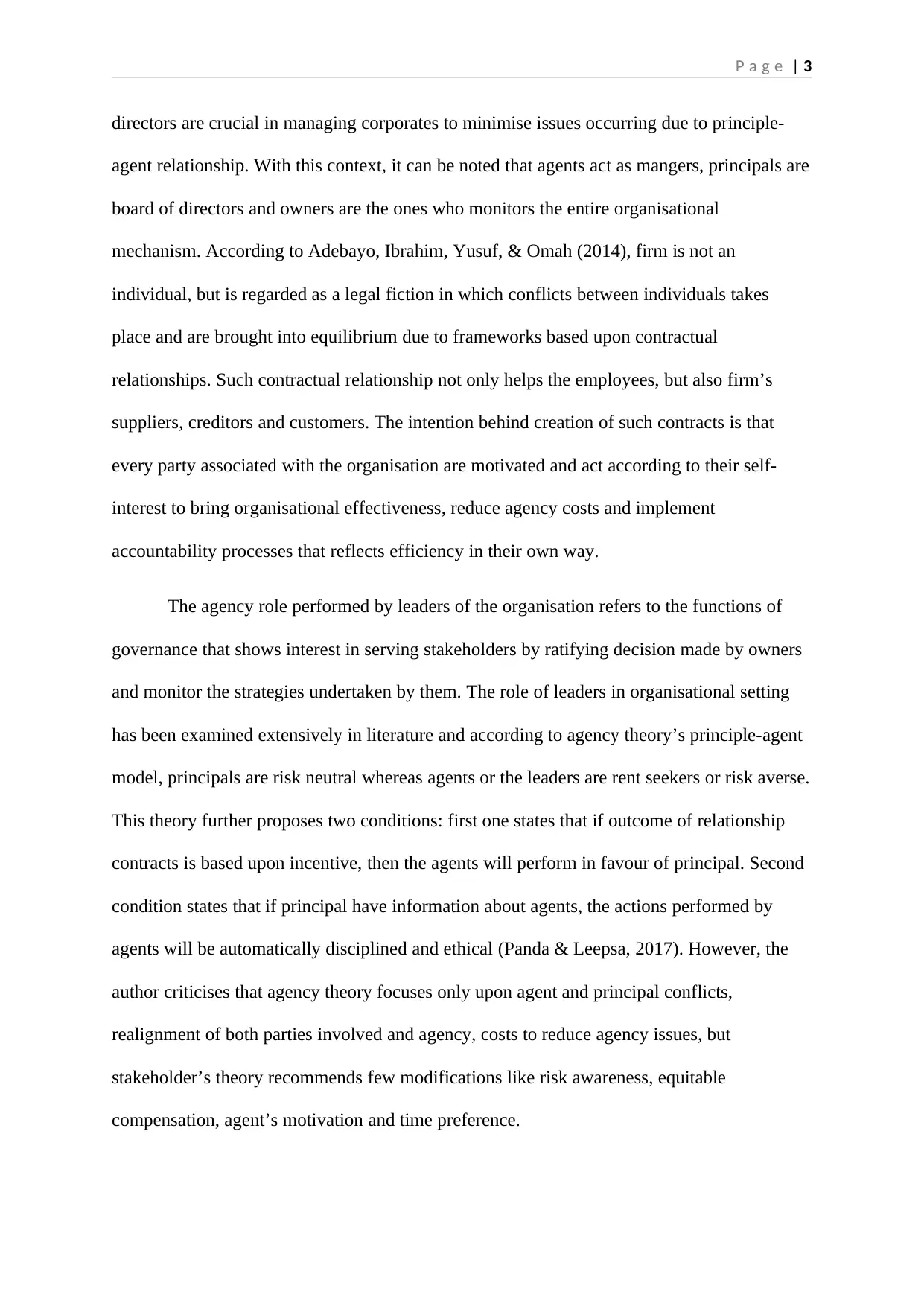
P a g e | 3
directors are crucial in managing corporates to minimise issues occurring due to principle-
agent relationship. With this context, it can be noted that agents act as mangers, principals are
board of directors and owners are the ones who monitors the entire organisational
mechanism. According to Adebayo, Ibrahim, Yusuf, & Omah (2014), firm is not an
individual, but is regarded as a legal fiction in which conflicts between individuals takes
place and are brought into equilibrium due to frameworks based upon contractual
relationships. Such contractual relationship not only helps the employees, but also firm’s
suppliers, creditors and customers. The intention behind creation of such contracts is that
every party associated with the organisation are motivated and act according to their self-
interest to bring organisational effectiveness, reduce agency costs and implement
accountability processes that reflects efficiency in their own way.
The agency role performed by leaders of the organisation refers to the functions of
governance that shows interest in serving stakeholders by ratifying decision made by owners
and monitor the strategies undertaken by them. The role of leaders in organisational setting
has been examined extensively in literature and according to agency theory’s principle-agent
model, principals are risk neutral whereas agents or the leaders are rent seekers or risk averse.
This theory further proposes two conditions: first one states that if outcome of relationship
contracts is based upon incentive, then the agents will perform in favour of principal. Second
condition states that if principal have information about agents, the actions performed by
agents will be automatically disciplined and ethical (Panda & Leepsa, 2017). However, the
author criticises that agency theory focuses only upon agent and principal conflicts,
realignment of both parties involved and agency, costs to reduce agency issues, but
stakeholder’s theory recommends few modifications like risk awareness, equitable
compensation, agent’s motivation and time preference.
directors are crucial in managing corporates to minimise issues occurring due to principle-
agent relationship. With this context, it can be noted that agents act as mangers, principals are
board of directors and owners are the ones who monitors the entire organisational
mechanism. According to Adebayo, Ibrahim, Yusuf, & Omah (2014), firm is not an
individual, but is regarded as a legal fiction in which conflicts between individuals takes
place and are brought into equilibrium due to frameworks based upon contractual
relationships. Such contractual relationship not only helps the employees, but also firm’s
suppliers, creditors and customers. The intention behind creation of such contracts is that
every party associated with the organisation are motivated and act according to their self-
interest to bring organisational effectiveness, reduce agency costs and implement
accountability processes that reflects efficiency in their own way.
The agency role performed by leaders of the organisation refers to the functions of
governance that shows interest in serving stakeholders by ratifying decision made by owners
and monitor the strategies undertaken by them. The role of leaders in organisational setting
has been examined extensively in literature and according to agency theory’s principle-agent
model, principals are risk neutral whereas agents or the leaders are rent seekers or risk averse.
This theory further proposes two conditions: first one states that if outcome of relationship
contracts is based upon incentive, then the agents will perform in favour of principal. Second
condition states that if principal have information about agents, the actions performed by
agents will be automatically disciplined and ethical (Panda & Leepsa, 2017). However, the
author criticises that agency theory focuses only upon agent and principal conflicts,
realignment of both parties involved and agency, costs to reduce agency issues, but
stakeholder’s theory recommends few modifications like risk awareness, equitable
compensation, agent’s motivation and time preference.
Paraphrase This Document
Need a fresh take? Get an instant paraphrase of this document with our AI Paraphraser
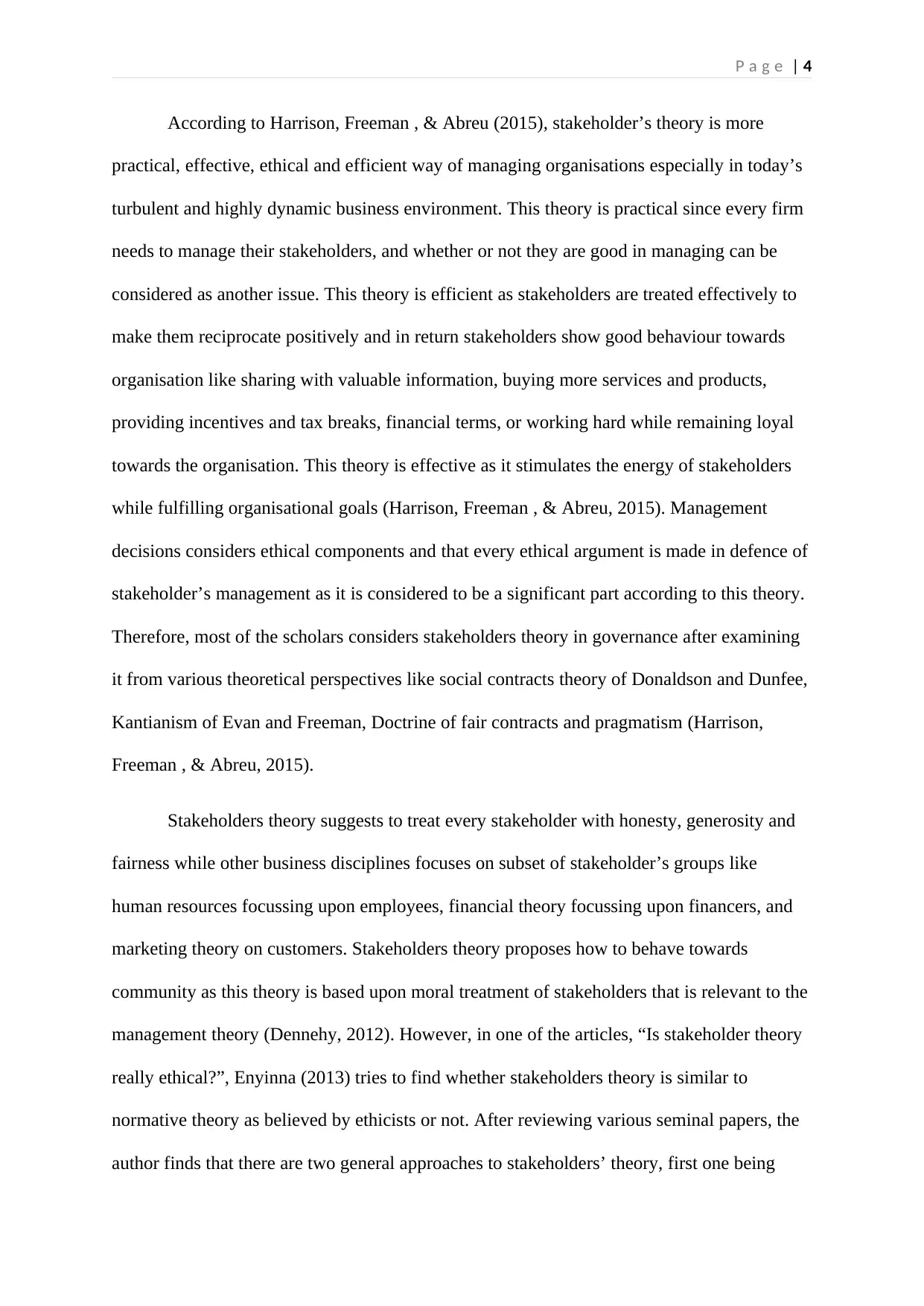
P a g e | 4
According to Harrison, Freeman , & Abreu (2015), stakeholder’s theory is more
practical, effective, ethical and efficient way of managing organisations especially in today’s
turbulent and highly dynamic business environment. This theory is practical since every firm
needs to manage their stakeholders, and whether or not they are good in managing can be
considered as another issue. This theory is efficient as stakeholders are treated effectively to
make them reciprocate positively and in return stakeholders show good behaviour towards
organisation like sharing with valuable information, buying more services and products,
providing incentives and tax breaks, financial terms, or working hard while remaining loyal
towards the organisation. This theory is effective as it stimulates the energy of stakeholders
while fulfilling organisational goals (Harrison, Freeman , & Abreu, 2015). Management
decisions considers ethical components and that every ethical argument is made in defence of
stakeholder’s management as it is considered to be a significant part according to this theory.
Therefore, most of the scholars considers stakeholders theory in governance after examining
it from various theoretical perspectives like social contracts theory of Donaldson and Dunfee,
Kantianism of Evan and Freeman, Doctrine of fair contracts and pragmatism (Harrison,
Freeman , & Abreu, 2015).
Stakeholders theory suggests to treat every stakeholder with honesty, generosity and
fairness while other business disciplines focuses on subset of stakeholder’s groups like
human resources focussing upon employees, financial theory focussing upon financers, and
marketing theory on customers. Stakeholders theory proposes how to behave towards
community as this theory is based upon moral treatment of stakeholders that is relevant to the
management theory (Dennehy, 2012). However, in one of the articles, “Is stakeholder theory
really ethical?”, Enyinna (2013) tries to find whether stakeholders theory is similar to
normative theory as believed by ethicists or not. After reviewing various seminal papers, the
author finds that there are two general approaches to stakeholders’ theory, first one being
According to Harrison, Freeman , & Abreu (2015), stakeholder’s theory is more
practical, effective, ethical and efficient way of managing organisations especially in today’s
turbulent and highly dynamic business environment. This theory is practical since every firm
needs to manage their stakeholders, and whether or not they are good in managing can be
considered as another issue. This theory is efficient as stakeholders are treated effectively to
make them reciprocate positively and in return stakeholders show good behaviour towards
organisation like sharing with valuable information, buying more services and products,
providing incentives and tax breaks, financial terms, or working hard while remaining loyal
towards the organisation. This theory is effective as it stimulates the energy of stakeholders
while fulfilling organisational goals (Harrison, Freeman , & Abreu, 2015). Management
decisions considers ethical components and that every ethical argument is made in defence of
stakeholder’s management as it is considered to be a significant part according to this theory.
Therefore, most of the scholars considers stakeholders theory in governance after examining
it from various theoretical perspectives like social contracts theory of Donaldson and Dunfee,
Kantianism of Evan and Freeman, Doctrine of fair contracts and pragmatism (Harrison,
Freeman , & Abreu, 2015).
Stakeholders theory suggests to treat every stakeholder with honesty, generosity and
fairness while other business disciplines focuses on subset of stakeholder’s groups like
human resources focussing upon employees, financial theory focussing upon financers, and
marketing theory on customers. Stakeholders theory proposes how to behave towards
community as this theory is based upon moral treatment of stakeholders that is relevant to the
management theory (Dennehy, 2012). However, in one of the articles, “Is stakeholder theory
really ethical?”, Enyinna (2013) tries to find whether stakeholders theory is similar to
normative theory as believed by ethicists or not. After reviewing various seminal papers, the
author finds that there are two general approaches to stakeholders’ theory, first one being
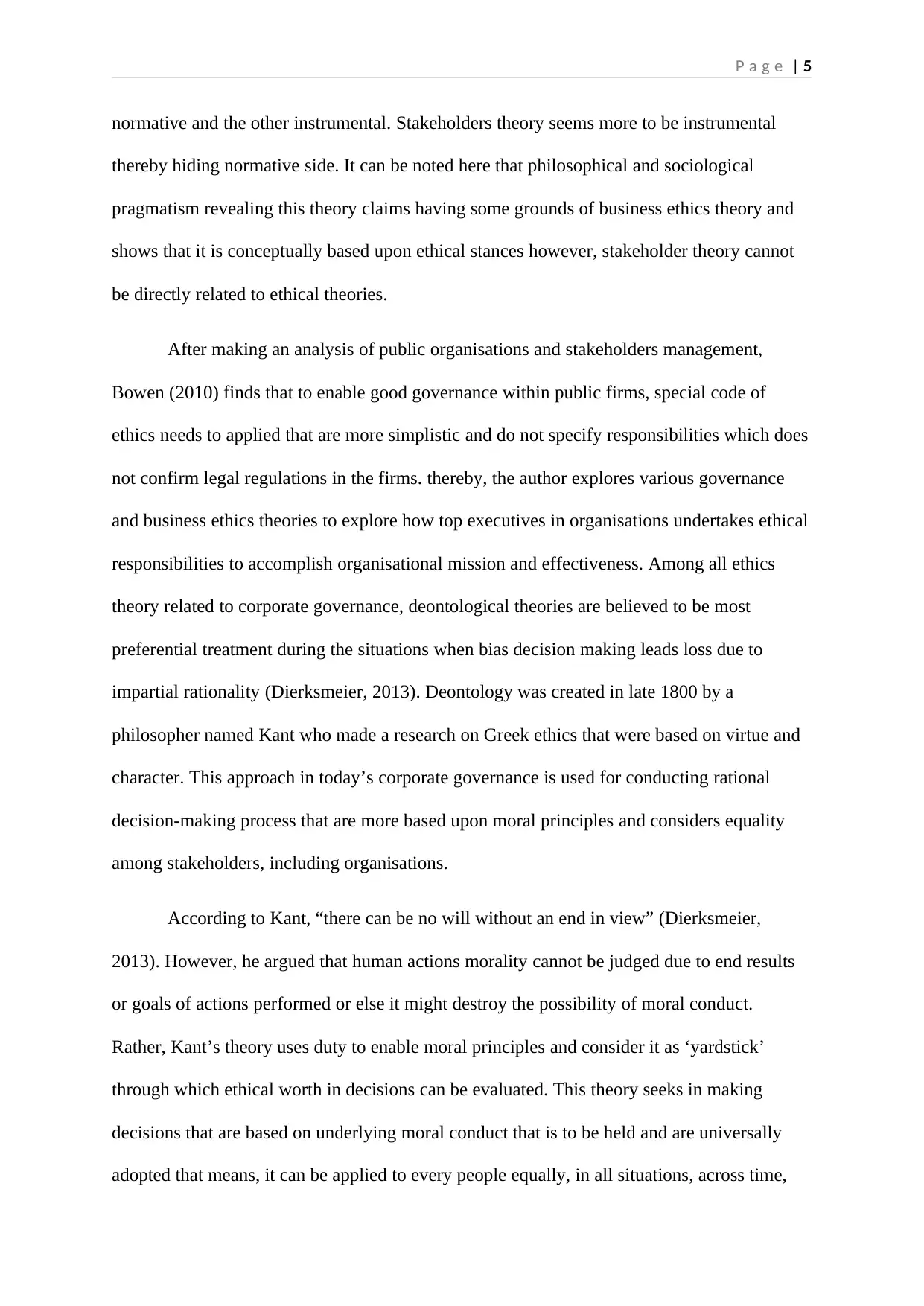
P a g e | 5
normative and the other instrumental. Stakeholders theory seems more to be instrumental
thereby hiding normative side. It can be noted here that philosophical and sociological
pragmatism revealing this theory claims having some grounds of business ethics theory and
shows that it is conceptually based upon ethical stances however, stakeholder theory cannot
be directly related to ethical theories.
After making an analysis of public organisations and stakeholders management,
Bowen (2010) finds that to enable good governance within public firms, special code of
ethics needs to applied that are more simplistic and do not specify responsibilities which does
not confirm legal regulations in the firms. thereby, the author explores various governance
and business ethics theories to explore how top executives in organisations undertakes ethical
responsibilities to accomplish organisational mission and effectiveness. Among all ethics
theory related to corporate governance, deontological theories are believed to be most
preferential treatment during the situations when bias decision making leads loss due to
impartial rationality (Dierksmeier, 2013). Deontology was created in late 1800 by a
philosopher named Kant who made a research on Greek ethics that were based on virtue and
character. This approach in today’s corporate governance is used for conducting rational
decision-making process that are more based upon moral principles and considers equality
among stakeholders, including organisations.
According to Kant, “there can be no will without an end in view” (Dierksmeier,
2013). However, he argued that human actions morality cannot be judged due to end results
or goals of actions performed or else it might destroy the possibility of moral conduct.
Rather, Kant’s theory uses duty to enable moral principles and consider it as ‘yardstick’
through which ethical worth in decisions can be evaluated. This theory seeks in making
decisions that are based on underlying moral conduct that is to be held and are universally
adopted that means, it can be applied to every people equally, in all situations, across time,
normative and the other instrumental. Stakeholders theory seems more to be instrumental
thereby hiding normative side. It can be noted here that philosophical and sociological
pragmatism revealing this theory claims having some grounds of business ethics theory and
shows that it is conceptually based upon ethical stances however, stakeholder theory cannot
be directly related to ethical theories.
After making an analysis of public organisations and stakeholders management,
Bowen (2010) finds that to enable good governance within public firms, special code of
ethics needs to applied that are more simplistic and do not specify responsibilities which does
not confirm legal regulations in the firms. thereby, the author explores various governance
and business ethics theories to explore how top executives in organisations undertakes ethical
responsibilities to accomplish organisational mission and effectiveness. Among all ethics
theory related to corporate governance, deontological theories are believed to be most
preferential treatment during the situations when bias decision making leads loss due to
impartial rationality (Dierksmeier, 2013). Deontology was created in late 1800 by a
philosopher named Kant who made a research on Greek ethics that were based on virtue and
character. This approach in today’s corporate governance is used for conducting rational
decision-making process that are more based upon moral principles and considers equality
among stakeholders, including organisations.
According to Kant, “there can be no will without an end in view” (Dierksmeier,
2013). However, he argued that human actions morality cannot be judged due to end results
or goals of actions performed or else it might destroy the possibility of moral conduct.
Rather, Kant’s theory uses duty to enable moral principles and consider it as ‘yardstick’
through which ethical worth in decisions can be evaluated. This theory seeks in making
decisions that are based on underlying moral conduct that is to be held and are universally
adopted that means, it can be applied to every people equally, in all situations, across time,
⊘ This is a preview!⊘
Do you want full access?
Subscribe today to unlock all pages.

Trusted by 1+ million students worldwide
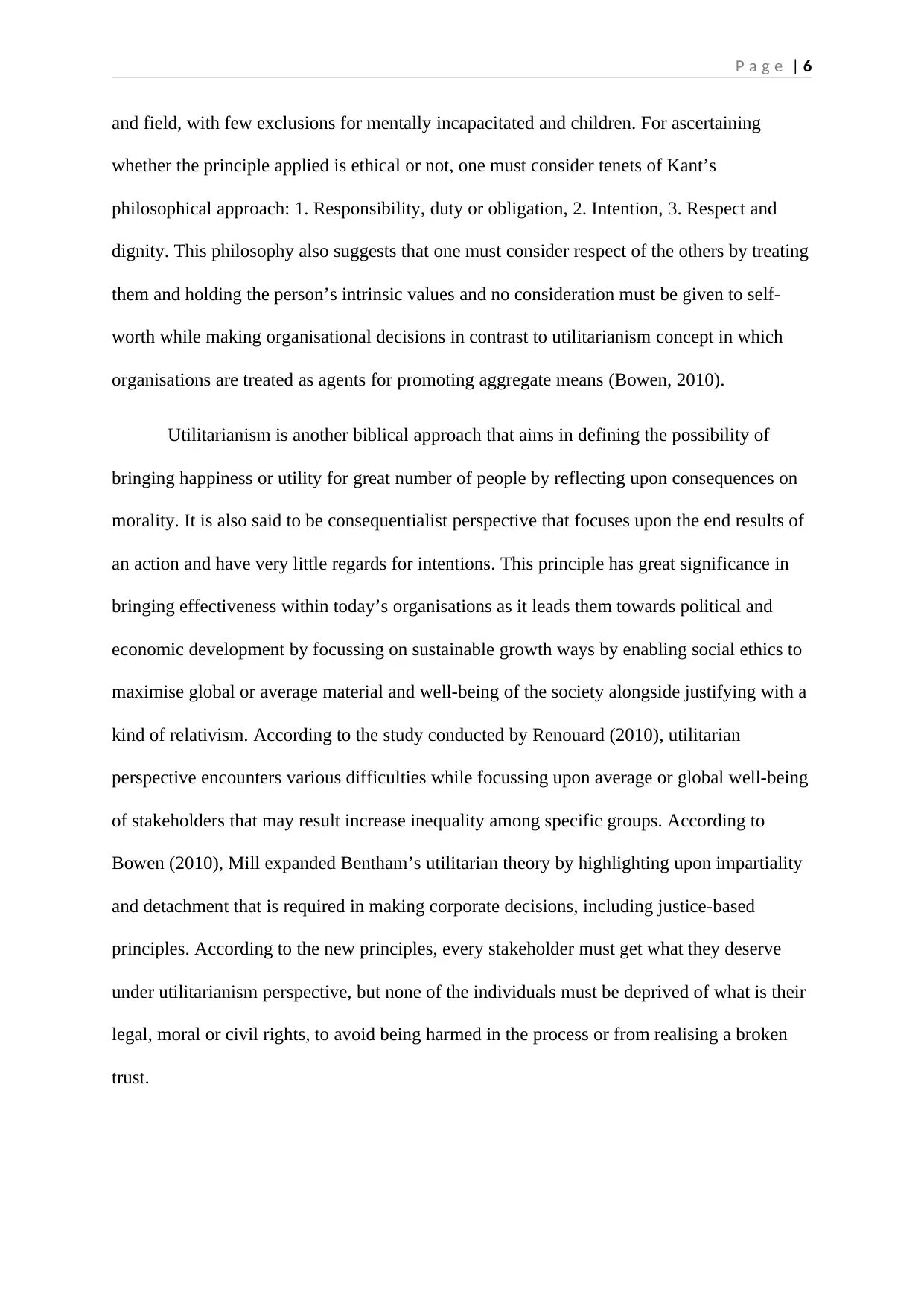
P a g e | 6
and field, with few exclusions for mentally incapacitated and children. For ascertaining
whether the principle applied is ethical or not, one must consider tenets of Kant’s
philosophical approach: 1. Responsibility, duty or obligation, 2. Intention, 3. Respect and
dignity. This philosophy also suggests that one must consider respect of the others by treating
them and holding the person’s intrinsic values and no consideration must be given to self-
worth while making organisational decisions in contrast to utilitarianism concept in which
organisations are treated as agents for promoting aggregate means (Bowen, 2010).
Utilitarianism is another biblical approach that aims in defining the possibility of
bringing happiness or utility for great number of people by reflecting upon consequences on
morality. It is also said to be consequentialist perspective that focuses upon the end results of
an action and have very little regards for intentions. This principle has great significance in
bringing effectiveness within today’s organisations as it leads them towards political and
economic development by focussing on sustainable growth ways by enabling social ethics to
maximise global or average material and well-being of the society alongside justifying with a
kind of relativism. According to the study conducted by Renouard (2010), utilitarian
perspective encounters various difficulties while focussing upon average or global well-being
of stakeholders that may result increase inequality among specific groups. According to
Bowen (2010), Mill expanded Bentham’s utilitarian theory by highlighting upon impartiality
and detachment that is required in making corporate decisions, including justice-based
principles. According to the new principles, every stakeholder must get what they deserve
under utilitarianism perspective, but none of the individuals must be deprived of what is their
legal, moral or civil rights, to avoid being harmed in the process or from realising a broken
trust.
and field, with few exclusions for mentally incapacitated and children. For ascertaining
whether the principle applied is ethical or not, one must consider tenets of Kant’s
philosophical approach: 1. Responsibility, duty or obligation, 2. Intention, 3. Respect and
dignity. This philosophy also suggests that one must consider respect of the others by treating
them and holding the person’s intrinsic values and no consideration must be given to self-
worth while making organisational decisions in contrast to utilitarianism concept in which
organisations are treated as agents for promoting aggregate means (Bowen, 2010).
Utilitarianism is another biblical approach that aims in defining the possibility of
bringing happiness or utility for great number of people by reflecting upon consequences on
morality. It is also said to be consequentialist perspective that focuses upon the end results of
an action and have very little regards for intentions. This principle has great significance in
bringing effectiveness within today’s organisations as it leads them towards political and
economic development by focussing on sustainable growth ways by enabling social ethics to
maximise global or average material and well-being of the society alongside justifying with a
kind of relativism. According to the study conducted by Renouard (2010), utilitarian
perspective encounters various difficulties while focussing upon average or global well-being
of stakeholders that may result increase inequality among specific groups. According to
Bowen (2010), Mill expanded Bentham’s utilitarian theory by highlighting upon impartiality
and detachment that is required in making corporate decisions, including justice-based
principles. According to the new principles, every stakeholder must get what they deserve
under utilitarianism perspective, but none of the individuals must be deprived of what is their
legal, moral or civil rights, to avoid being harmed in the process or from realising a broken
trust.
Paraphrase This Document
Need a fresh take? Get an instant paraphrase of this document with our AI Paraphraser
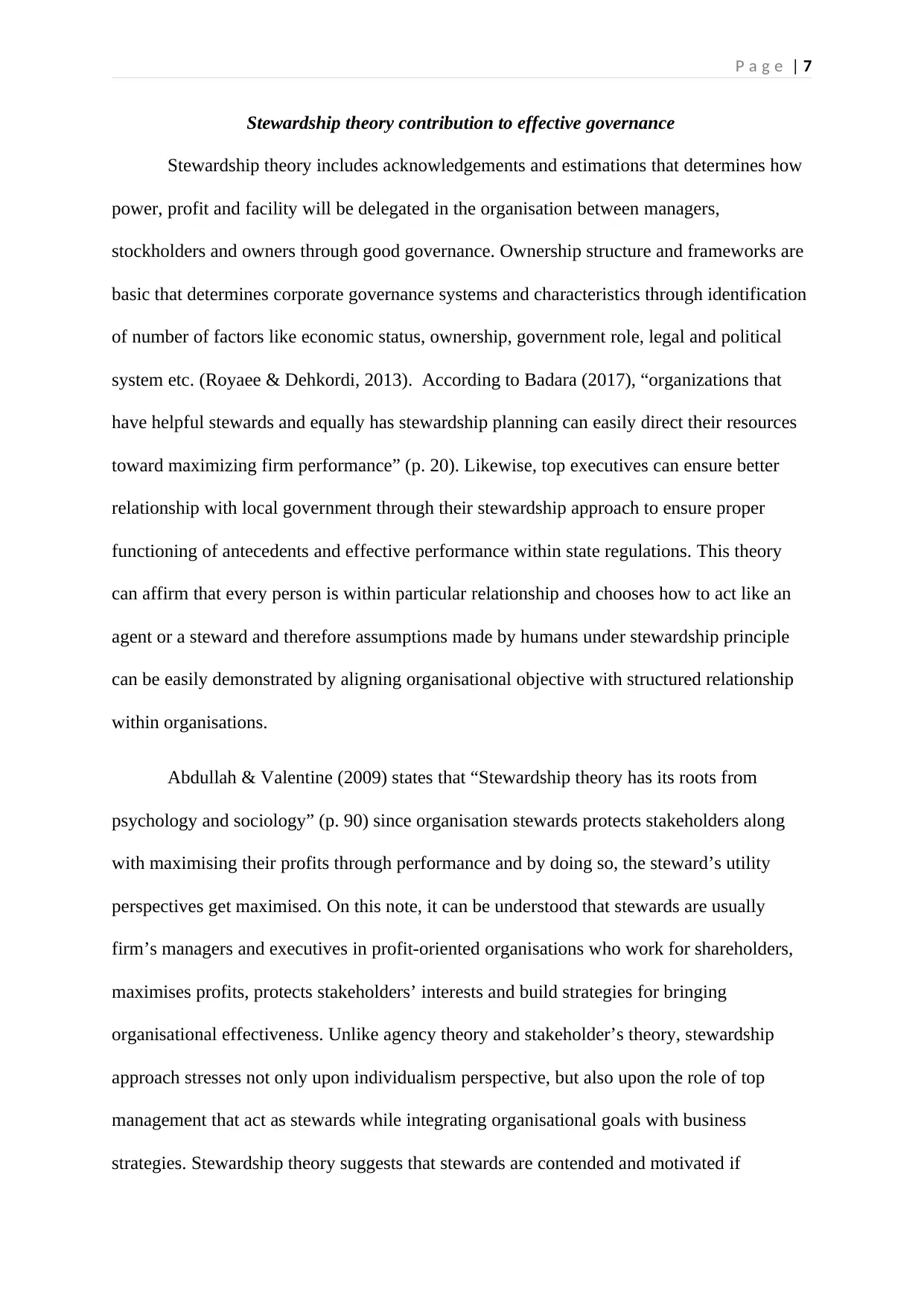
P a g e | 7
Stewardship theory contribution to effective governance
Stewardship theory includes acknowledgements and estimations that determines how
power, profit and facility will be delegated in the organisation between managers,
stockholders and owners through good governance. Ownership structure and frameworks are
basic that determines corporate governance systems and characteristics through identification
of number of factors like economic status, ownership, government role, legal and political
system etc. (Royaee & Dehkordi, 2013). According to Badara (2017), “organizations that
have helpful stewards and equally has stewardship planning can easily direct their resources
toward maximizing firm performance” (p. 20). Likewise, top executives can ensure better
relationship with local government through their stewardship approach to ensure proper
functioning of antecedents and effective performance within state regulations. This theory
can affirm that every person is within particular relationship and chooses how to act like an
agent or a steward and therefore assumptions made by humans under stewardship principle
can be easily demonstrated by aligning organisational objective with structured relationship
within organisations.
Abdullah & Valentine (2009) states that “Stewardship theory has its roots from
psychology and sociology” (p. 90) since organisation stewards protects stakeholders along
with maximising their profits through performance and by doing so, the steward’s utility
perspectives get maximised. On this note, it can be understood that stewards are usually
firm’s managers and executives in profit-oriented organisations who work for shareholders,
maximises profits, protects stakeholders’ interests and build strategies for bringing
organisational effectiveness. Unlike agency theory and stakeholder’s theory, stewardship
approach stresses not only upon individualism perspective, but also upon the role of top
management that act as stewards while integrating organisational goals with business
strategies. Stewardship theory suggests that stewards are contended and motivated if
Stewardship theory contribution to effective governance
Stewardship theory includes acknowledgements and estimations that determines how
power, profit and facility will be delegated in the organisation between managers,
stockholders and owners through good governance. Ownership structure and frameworks are
basic that determines corporate governance systems and characteristics through identification
of number of factors like economic status, ownership, government role, legal and political
system etc. (Royaee & Dehkordi, 2013). According to Badara (2017), “organizations that
have helpful stewards and equally has stewardship planning can easily direct their resources
toward maximizing firm performance” (p. 20). Likewise, top executives can ensure better
relationship with local government through their stewardship approach to ensure proper
functioning of antecedents and effective performance within state regulations. This theory
can affirm that every person is within particular relationship and chooses how to act like an
agent or a steward and therefore assumptions made by humans under stewardship principle
can be easily demonstrated by aligning organisational objective with structured relationship
within organisations.
Abdullah & Valentine (2009) states that “Stewardship theory has its roots from
psychology and sociology” (p. 90) since organisation stewards protects stakeholders along
with maximising their profits through performance and by doing so, the steward’s utility
perspectives get maximised. On this note, it can be understood that stewards are usually
firm’s managers and executives in profit-oriented organisations who work for shareholders,
maximises profits, protects stakeholders’ interests and build strategies for bringing
organisational effectiveness. Unlike agency theory and stakeholder’s theory, stewardship
approach stresses not only upon individualism perspective, but also upon the role of top
management that act as stewards while integrating organisational goals with business
strategies. Stewardship theory suggests that stewards are contended and motivated if
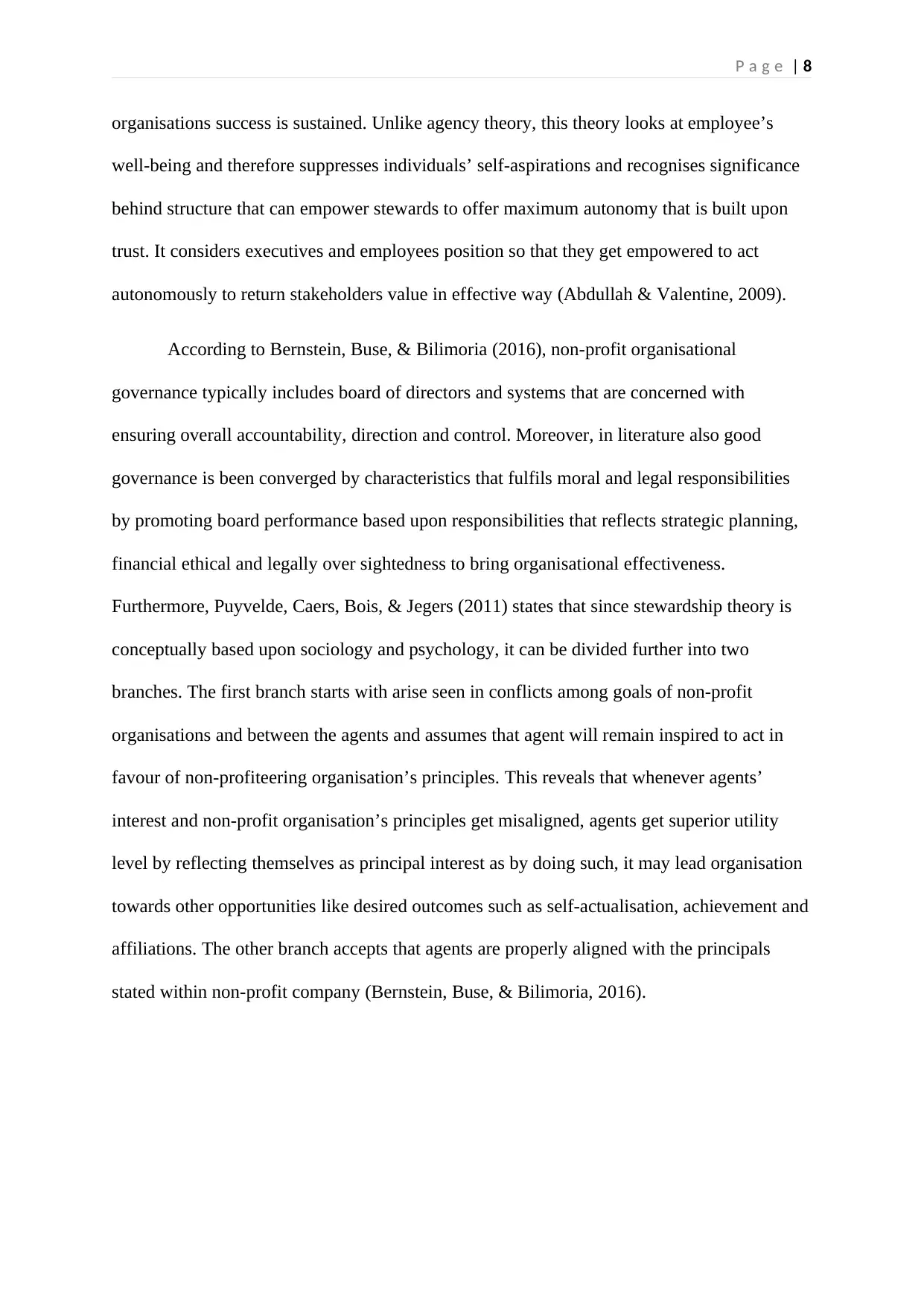
P a g e | 8
organisations success is sustained. Unlike agency theory, this theory looks at employee’s
well-being and therefore suppresses individuals’ self-aspirations and recognises significance
behind structure that can empower stewards to offer maximum autonomy that is built upon
trust. It considers executives and employees position so that they get empowered to act
autonomously to return stakeholders value in effective way (Abdullah & Valentine, 2009).
According to Bernstein, Buse, & Bilimoria (2016), non-profit organisational
governance typically includes board of directors and systems that are concerned with
ensuring overall accountability, direction and control. Moreover, in literature also good
governance is been converged by characteristics that fulfils moral and legal responsibilities
by promoting board performance based upon responsibilities that reflects strategic planning,
financial ethical and legally over sightedness to bring organisational effectiveness.
Furthermore, Puyvelde, Caers, Bois, & Jegers (2011) states that since stewardship theory is
conceptually based upon sociology and psychology, it can be divided further into two
branches. The first branch starts with arise seen in conflicts among goals of non-profit
organisations and between the agents and assumes that agent will remain inspired to act in
favour of non-profiteering organisation’s principles. This reveals that whenever agents’
interest and non-profit organisation’s principles get misaligned, agents get superior utility
level by reflecting themselves as principal interest as by doing such, it may lead organisation
towards other opportunities like desired outcomes such as self-actualisation, achievement and
affiliations. The other branch accepts that agents are properly aligned with the principals
stated within non-profit company (Bernstein, Buse, & Bilimoria, 2016).
organisations success is sustained. Unlike agency theory, this theory looks at employee’s
well-being and therefore suppresses individuals’ self-aspirations and recognises significance
behind structure that can empower stewards to offer maximum autonomy that is built upon
trust. It considers executives and employees position so that they get empowered to act
autonomously to return stakeholders value in effective way (Abdullah & Valentine, 2009).
According to Bernstein, Buse, & Bilimoria (2016), non-profit organisational
governance typically includes board of directors and systems that are concerned with
ensuring overall accountability, direction and control. Moreover, in literature also good
governance is been converged by characteristics that fulfils moral and legal responsibilities
by promoting board performance based upon responsibilities that reflects strategic planning,
financial ethical and legally over sightedness to bring organisational effectiveness.
Furthermore, Puyvelde, Caers, Bois, & Jegers (2011) states that since stewardship theory is
conceptually based upon sociology and psychology, it can be divided further into two
branches. The first branch starts with arise seen in conflicts among goals of non-profit
organisations and between the agents and assumes that agent will remain inspired to act in
favour of non-profiteering organisation’s principles. This reveals that whenever agents’
interest and non-profit organisation’s principles get misaligned, agents get superior utility
level by reflecting themselves as principal interest as by doing such, it may lead organisation
towards other opportunities like desired outcomes such as self-actualisation, achievement and
affiliations. The other branch accepts that agents are properly aligned with the principals
stated within non-profit company (Bernstein, Buse, & Bilimoria, 2016).
⊘ This is a preview!⊘
Do you want full access?
Subscribe today to unlock all pages.

Trusted by 1+ million students worldwide
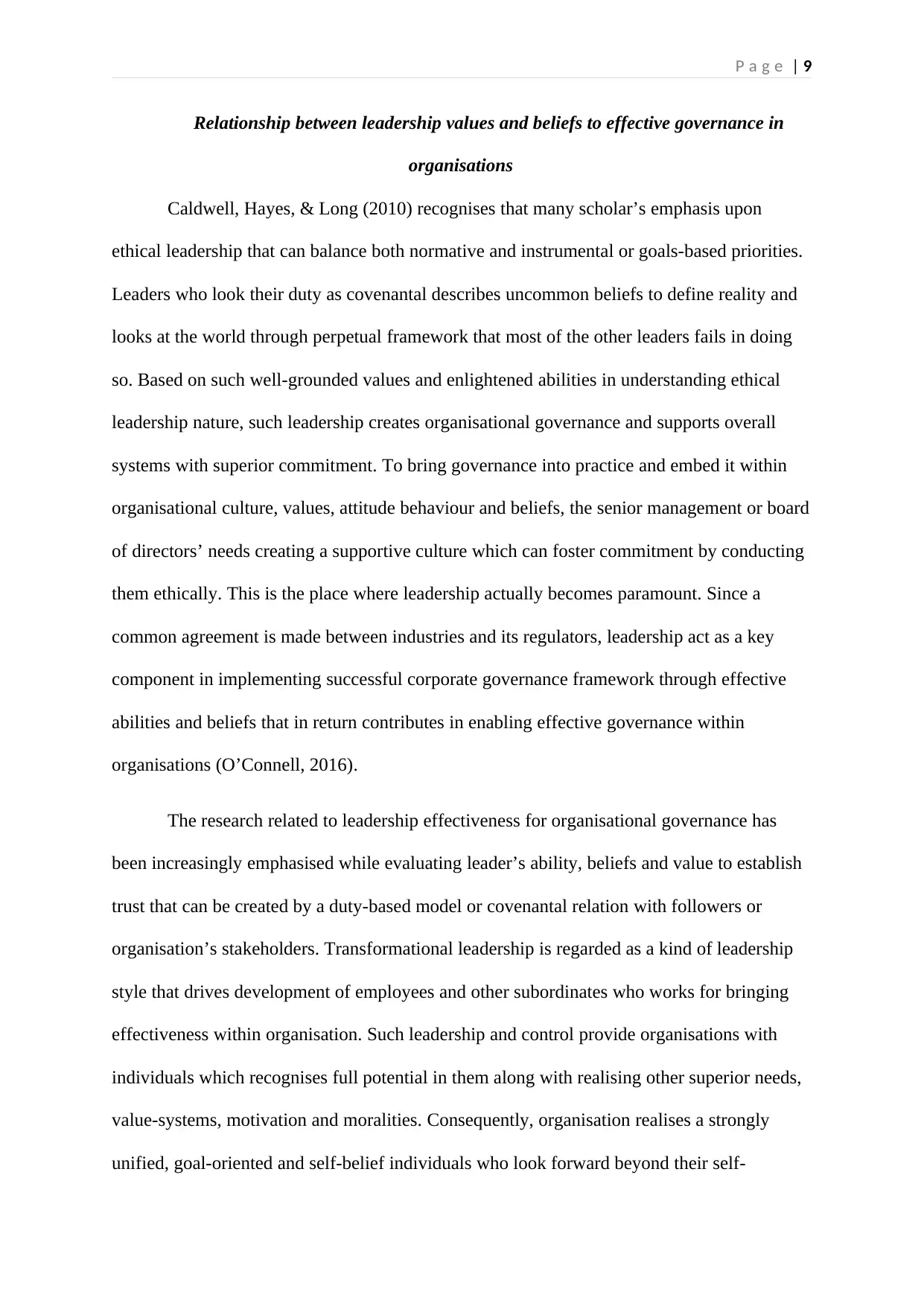
P a g e | 9
Relationship between leadership values and beliefs to effective governance in
organisations
Caldwell, Hayes, & Long (2010) recognises that many scholar’s emphasis upon
ethical leadership that can balance both normative and instrumental or goals-based priorities.
Leaders who look their duty as covenantal describes uncommon beliefs to define reality and
looks at the world through perpetual framework that most of the other leaders fails in doing
so. Based on such well-grounded values and enlightened abilities in understanding ethical
leadership nature, such leadership creates organisational governance and supports overall
systems with superior commitment. To bring governance into practice and embed it within
organisational culture, values, attitude behaviour and beliefs, the senior management or board
of directors’ needs creating a supportive culture which can foster commitment by conducting
them ethically. This is the place where leadership actually becomes paramount. Since a
common agreement is made between industries and its regulators, leadership act as a key
component in implementing successful corporate governance framework through effective
abilities and beliefs that in return contributes in enabling effective governance within
organisations (O’Connell, 2016).
The research related to leadership effectiveness for organisational governance has
been increasingly emphasised while evaluating leader’s ability, beliefs and value to establish
trust that can be created by a duty-based model or covenantal relation with followers or
organisation’s stakeholders. Transformational leadership is regarded as a kind of leadership
style that drives development of employees and other subordinates who works for bringing
effectiveness within organisation. Such leadership and control provide organisations with
individuals which recognises full potential in them along with realising other superior needs,
value-systems, motivation and moralities. Consequently, organisation realises a strongly
unified, goal-oriented and self-belief individuals who look forward beyond their self-
Relationship between leadership values and beliefs to effective governance in
organisations
Caldwell, Hayes, & Long (2010) recognises that many scholar’s emphasis upon
ethical leadership that can balance both normative and instrumental or goals-based priorities.
Leaders who look their duty as covenantal describes uncommon beliefs to define reality and
looks at the world through perpetual framework that most of the other leaders fails in doing
so. Based on such well-grounded values and enlightened abilities in understanding ethical
leadership nature, such leadership creates organisational governance and supports overall
systems with superior commitment. To bring governance into practice and embed it within
organisational culture, values, attitude behaviour and beliefs, the senior management or board
of directors’ needs creating a supportive culture which can foster commitment by conducting
them ethically. This is the place where leadership actually becomes paramount. Since a
common agreement is made between industries and its regulators, leadership act as a key
component in implementing successful corporate governance framework through effective
abilities and beliefs that in return contributes in enabling effective governance within
organisations (O’Connell, 2016).
The research related to leadership effectiveness for organisational governance has
been increasingly emphasised while evaluating leader’s ability, beliefs and value to establish
trust that can be created by a duty-based model or covenantal relation with followers or
organisation’s stakeholders. Transformational leadership is regarded as a kind of leadership
style that drives development of employees and other subordinates who works for bringing
effectiveness within organisation. Such leadership and control provide organisations with
individuals which recognises full potential in them along with realising other superior needs,
value-systems, motivation and moralities. Consequently, organisation realises a strongly
unified, goal-oriented and self-belief individuals who look forward beyond their self-
Paraphrase This Document
Need a fresh take? Get an instant paraphrase of this document with our AI Paraphraser
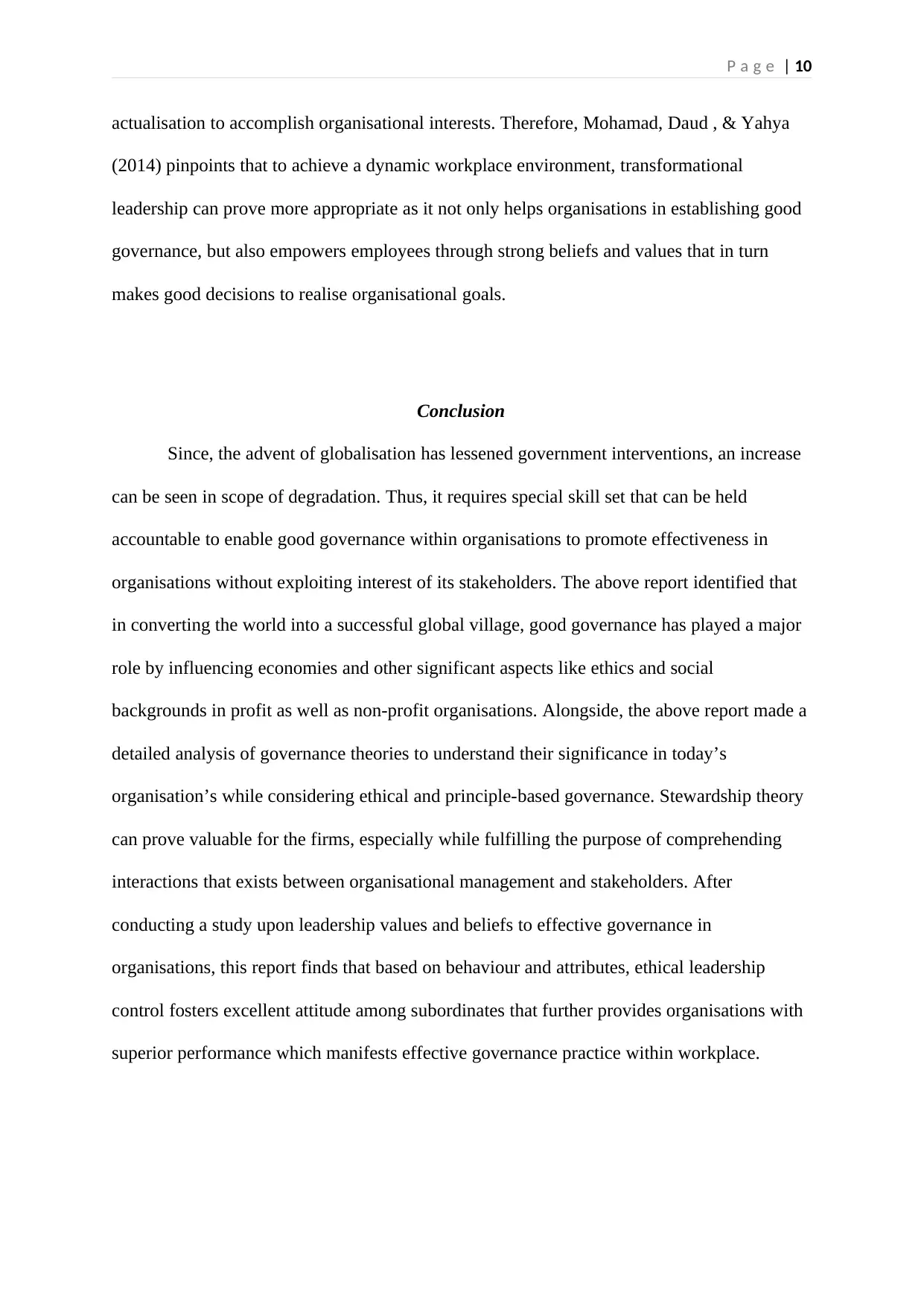
P a g e | 10
actualisation to accomplish organisational interests. Therefore, Mohamad, Daud , & Yahya
(2014) pinpoints that to achieve a dynamic workplace environment, transformational
leadership can prove more appropriate as it not only helps organisations in establishing good
governance, but also empowers employees through strong beliefs and values that in turn
makes good decisions to realise organisational goals.
Conclusion
Since, the advent of globalisation has lessened government interventions, an increase
can be seen in scope of degradation. Thus, it requires special skill set that can be held
accountable to enable good governance within organisations to promote effectiveness in
organisations without exploiting interest of its stakeholders. The above report identified that
in converting the world into a successful global village, good governance has played a major
role by influencing economies and other significant aspects like ethics and social
backgrounds in profit as well as non-profit organisations. Alongside, the above report made a
detailed analysis of governance theories to understand their significance in today’s
organisation’s while considering ethical and principle-based governance. Stewardship theory
can prove valuable for the firms, especially while fulfilling the purpose of comprehending
interactions that exists between organisational management and stakeholders. After
conducting a study upon leadership values and beliefs to effective governance in
organisations, this report finds that based on behaviour and attributes, ethical leadership
control fosters excellent attitude among subordinates that further provides organisations with
superior performance which manifests effective governance practice within workplace.
actualisation to accomplish organisational interests. Therefore, Mohamad, Daud , & Yahya
(2014) pinpoints that to achieve a dynamic workplace environment, transformational
leadership can prove more appropriate as it not only helps organisations in establishing good
governance, but also empowers employees through strong beliefs and values that in turn
makes good decisions to realise organisational goals.
Conclusion
Since, the advent of globalisation has lessened government interventions, an increase
can be seen in scope of degradation. Thus, it requires special skill set that can be held
accountable to enable good governance within organisations to promote effectiveness in
organisations without exploiting interest of its stakeholders. The above report identified that
in converting the world into a successful global village, good governance has played a major
role by influencing economies and other significant aspects like ethics and social
backgrounds in profit as well as non-profit organisations. Alongside, the above report made a
detailed analysis of governance theories to understand their significance in today’s
organisation’s while considering ethical and principle-based governance. Stewardship theory
can prove valuable for the firms, especially while fulfilling the purpose of comprehending
interactions that exists between organisational management and stakeholders. After
conducting a study upon leadership values and beliefs to effective governance in
organisations, this report finds that based on behaviour and attributes, ethical leadership
control fosters excellent attitude among subordinates that further provides organisations with
superior performance which manifests effective governance practice within workplace.
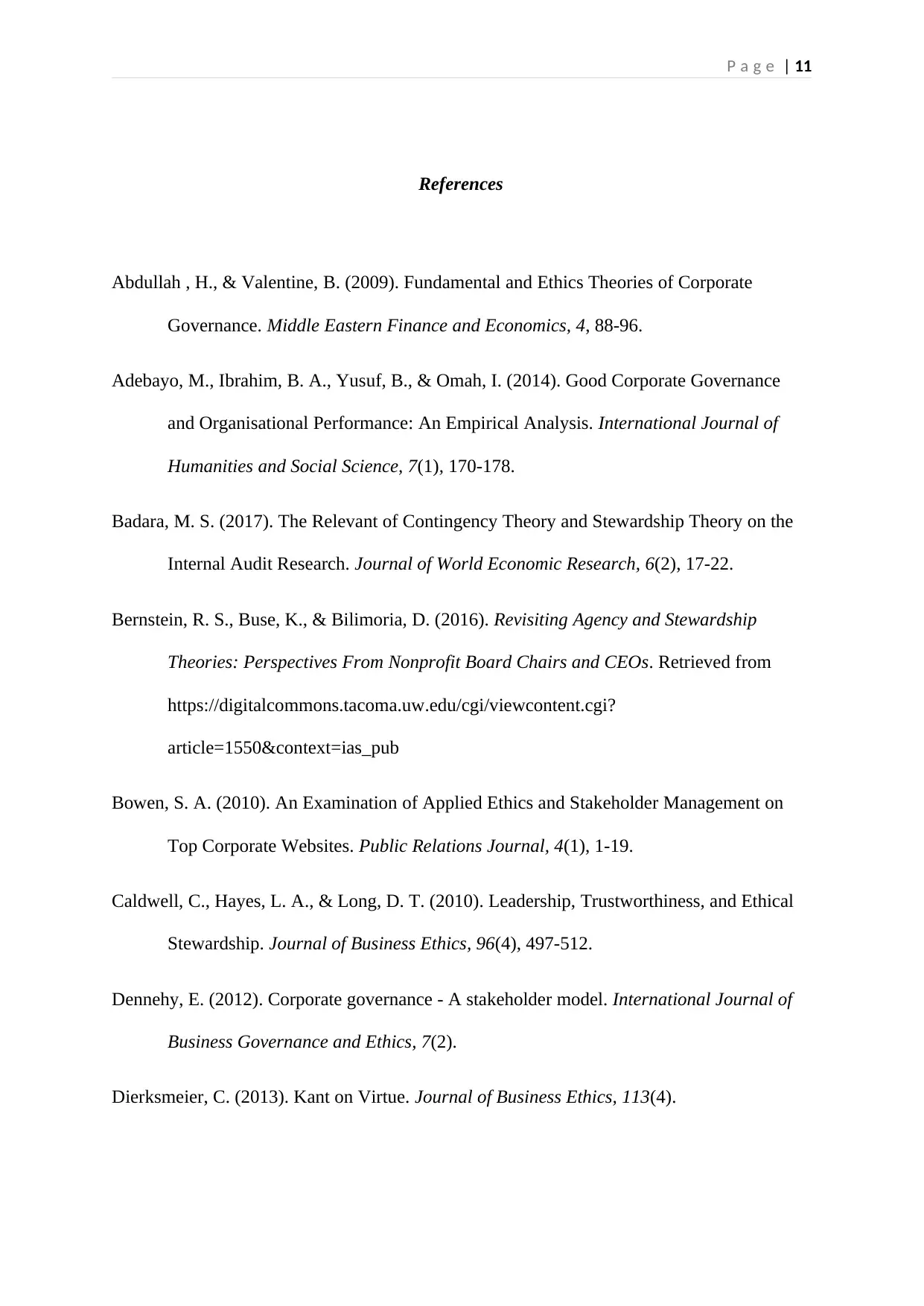
P a g e | 11
References
Abdullah , H., & Valentine, B. (2009). Fundamental and Ethics Theories of Corporate
Governance. Middle Eastern Finance and Economics, 4, 88-96.
Adebayo, M., Ibrahim, B. A., Yusuf, B., & Omah, I. (2014). Good Corporate Governance
and Organisational Performance: An Empirical Analysis. International Journal of
Humanities and Social Science, 7(1), 170-178.
Badara, M. S. (2017). The Relevant of Contingency Theory and Stewardship Theory on the
Internal Audit Research. Journal of World Economic Research, 6(2), 17-22.
Bernstein, R. S., Buse, K., & Bilimoria, D. (2016). Revisiting Agency and Stewardship
Theories: Perspectives From Nonprofit Board Chairs and CEOs. Retrieved from
https://digitalcommons.tacoma.uw.edu/cgi/viewcontent.cgi?
article=1550&context=ias_pub
Bowen, S. A. (2010). An Examination of Applied Ethics and Stakeholder Management on
Top Corporate Websites. Public Relations Journal, 4(1), 1-19.
Caldwell, C., Hayes, L. A., & Long, D. T. (2010). Leadership, Trustworthiness, and Ethical
Stewardship. Journal of Business Ethics, 96(4), 497-512.
Dennehy, E. (2012). Corporate governance - A stakeholder model. International Journal of
Business Governance and Ethics, 7(2).
Dierksmeier, C. (2013). Kant on Virtue. Journal of Business Ethics, 113(4).
References
Abdullah , H., & Valentine, B. (2009). Fundamental and Ethics Theories of Corporate
Governance. Middle Eastern Finance and Economics, 4, 88-96.
Adebayo, M., Ibrahim, B. A., Yusuf, B., & Omah, I. (2014). Good Corporate Governance
and Organisational Performance: An Empirical Analysis. International Journal of
Humanities and Social Science, 7(1), 170-178.
Badara, M. S. (2017). The Relevant of Contingency Theory and Stewardship Theory on the
Internal Audit Research. Journal of World Economic Research, 6(2), 17-22.
Bernstein, R. S., Buse, K., & Bilimoria, D. (2016). Revisiting Agency and Stewardship
Theories: Perspectives From Nonprofit Board Chairs and CEOs. Retrieved from
https://digitalcommons.tacoma.uw.edu/cgi/viewcontent.cgi?
article=1550&context=ias_pub
Bowen, S. A. (2010). An Examination of Applied Ethics and Stakeholder Management on
Top Corporate Websites. Public Relations Journal, 4(1), 1-19.
Caldwell, C., Hayes, L. A., & Long, D. T. (2010). Leadership, Trustworthiness, and Ethical
Stewardship. Journal of Business Ethics, 96(4), 497-512.
Dennehy, E. (2012). Corporate governance - A stakeholder model. International Journal of
Business Governance and Ethics, 7(2).
Dierksmeier, C. (2013). Kant on Virtue. Journal of Business Ethics, 113(4).
⊘ This is a preview!⊘
Do you want full access?
Subscribe today to unlock all pages.

Trusted by 1+ million students worldwide
1 out of 14
Related Documents
Your All-in-One AI-Powered Toolkit for Academic Success.
+13062052269
info@desklib.com
Available 24*7 on WhatsApp / Email
![[object Object]](/_next/static/media/star-bottom.7253800d.svg)
Unlock your academic potential
Copyright © 2020–2026 A2Z Services. All Rights Reserved. Developed and managed by ZUCOL.




